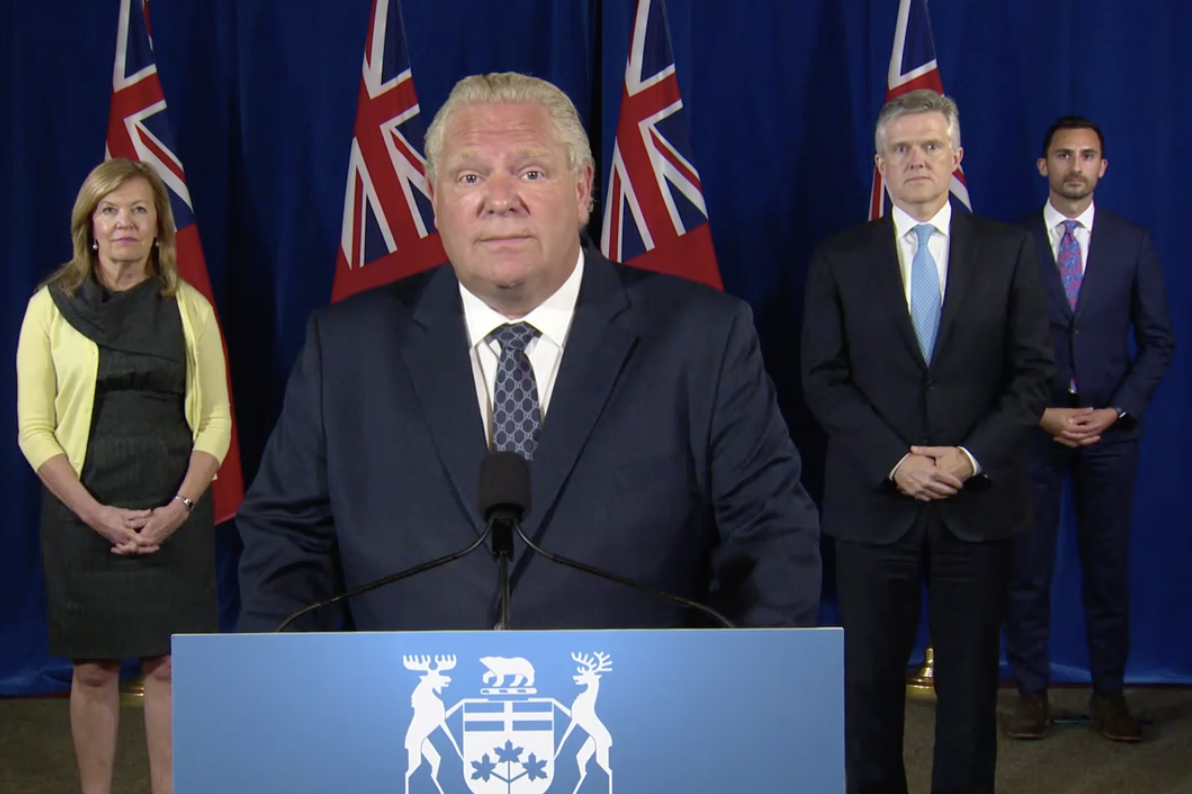WELLINGTON COUNTY – What little hope remained for a traditional holiday season in Ontario was quashed on Dec. 21.
That afternoon Premier Doug Ford announced a province-wide lockdown, starting on Dec. 26, to help slow the spread of COVID-19.
“The number of daily cases continue to rise putting our hospitals and long-term care homes at risk,” Ford said in a Dec. 21 press release.
“We need to stop the spread of this deadly virus. That’s why, on the advice of [Dr. David Williams, the province’s Chief Medical Officer of Health], we are taking the difficult but necessary decision to shutdown the province and ask people to stay home.
“Nothing is more important right now than the health and safety of all Ontarians.”
The restrictions will be similar to those imposed in March, with indoor social gatherings prohibited and only those businesses deemed essential allowed to stay open.
In the southern portion of the province – roughly south of Sudbury – the shutdown will be in effect for 28 days (until Jan. 23), while in the north it will last 14 days (until Jan. 9).
Elementary school students will switch to remote learning from Jan. 4 to 8, before returning to in-person learning on Jan. 11.
Secondary school students will continue learning remotely until Jan. 25, when they may resume in-person learning.
Child care will remain open for the duration of the lockdown, but can not serve school-aged children between Jan. 4 and 8. Before and after school programs will also be closed during that week, but emergency child care for health care and frontline workers will be provided.
The lockdown announcement comes as Ontario continues to see rising numbers of new daily cases, with 2,123 reported on Dec. 21, including 17 deaths.
To date the province has reported over 162,000 cases and over 4,000 deaths.
Recent modelling shows that, under any scenario, Ontario could have up to 300 patients with cases of COVID-19 in intensive care units by the end of the month.
At the current COVID-19 rate of transmission, that figure would grow to around 700 by the end of January. For comparison, about 264 patients required intensive care treatment during the height of the first wave of the pandemic.
The Ontario Medical Association (OMA) called for a widespread shutdown last week, noting hospitals are already preparing for a surge in cases over the holidays and doctors are worried there may not be enough resources to care for everybody.
“This is not the holiday season any of us wanted or had hoped for,” said OMA CEO Allan O’Dette.
“Vaccines are on the way. But in the meantime, we all have a part to play in ending this pandemic so we can all return to work and school.
“Protecting our own health is the first step to restoring economic health.”
Ontario’s existing COVID-19 framework, including the five colour-coded alert levels, will be put on hold during the province-wide shutdown.
What’s affected?
Under the lockdown, indoor gatherings with those outside your household are not permitted (those who live alone can chose have contact with one other household). Outdoor gatherings are restricted to a maximum of 10 people.
Weddings, funerals, and other religious services will be restricted to 10 people indoors or 10 people outdoors (with physical distancing).
Dining establishments and bars will be open for takeout, drive-through and delivery only.
Non-essential retail businesses can remain open for curbside pick-up or delivery only.
Discount and big box retailers selling groceries will be limited to 25 per cent capacity for in-store shopping.
Grocery stores, hardware stores, pharmacies, liquor stores, convenience stores and safety supply stores and can operate at 50 per cent capacity.
The following businesses/facilities must close:
- personal care services, including spas and barbers;
- casinos, bingo halls and other gaming establishments;
- indoor sports and recreational facilities.
Most manufacturing, agricultural, supply chain and construction operations will continue.
In general, residents are advised to limit trips outside their homes to essential reasons (work, school, groceries/pharmacy, health care, assisting vulnerable individuals or exercise and physical activity).
Ontarians are also asked to work remotely, wherever possible.
For more details on the lockdown, including how it affects various business sectors, click here.




